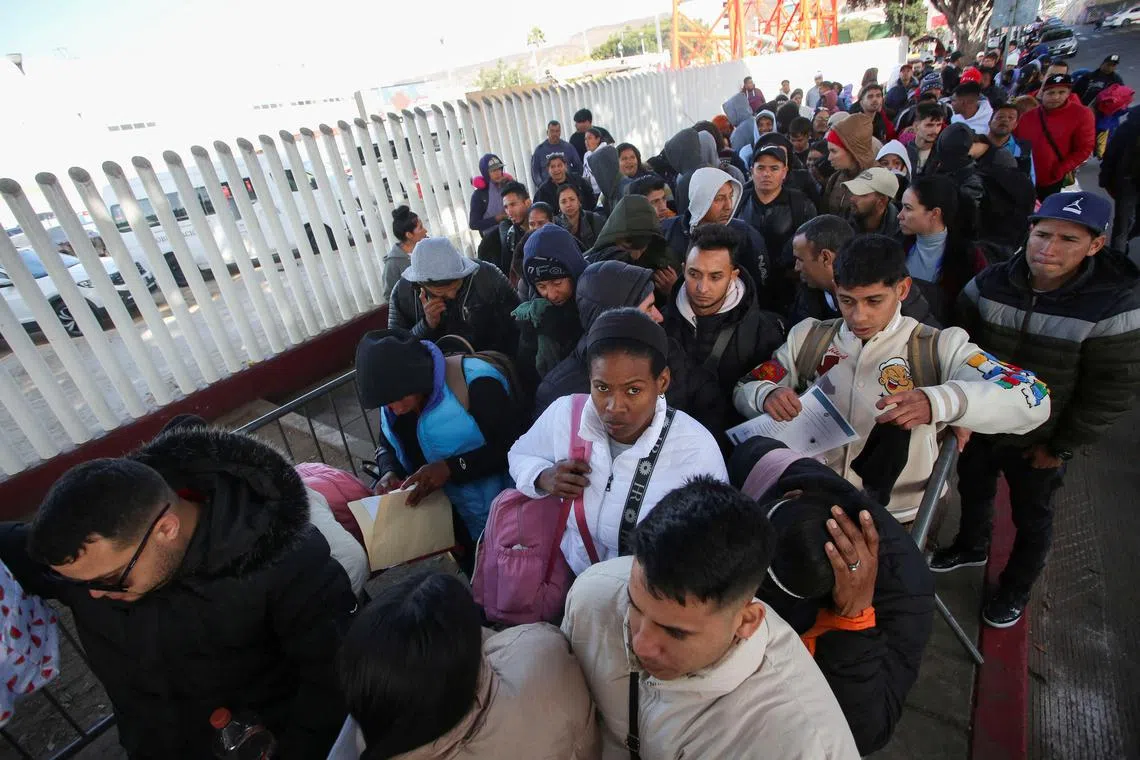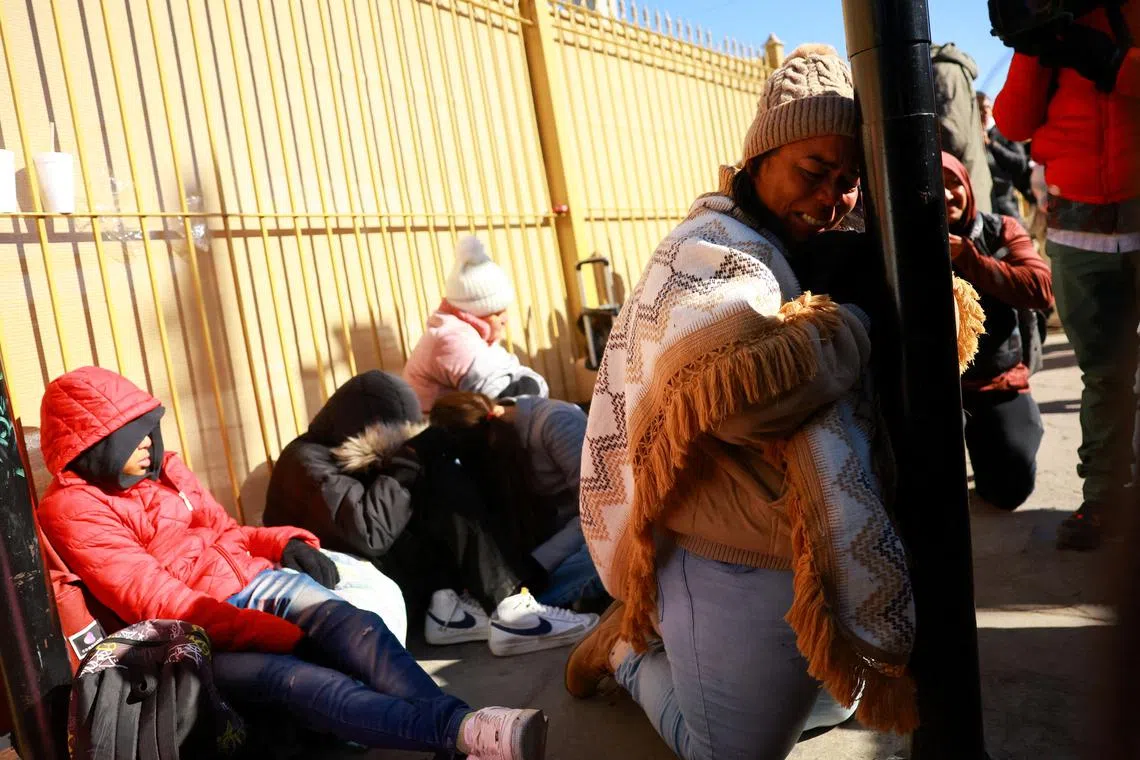Trump launches sweeping border crackdown, mass deportation push
Sign up now: Get ST's newsletters delivered to your inbox

Migrants gathering at the El Chaparral border crossing on Jan 20 after their CBP One app asylum appointments were cancelled on the day of US President Donald Trump's inauguration.
PHOTO: REUTERS
WASHINGTON/PIEDRAS NEGRAS, Mexico – US President Donald Trump on Jan 20 kicked off his sweeping immigration crackdown, tasking the US military with aiding border security, issuing a broad ban on asylum and taking steps to restrict citizenship for children born on US soil.
Declaring illegal immigration a national emergency, Mr Trump ordered the Pentagon to provide support for border wall construction, detention space and migrant transportation, and empowered the Secretary of Defence to send troops to the border as needed.
Mr Trump called for his administration to reinstate his “remain in Mexico” programme, which forced non-Mexican migrants to wait in Mexico for the resolution of their US cases.
Shortly after the inauguration, US border authorities said they had shut down outgoing president Joe Biden’s CBP One entry programme, which had allowed hundreds of thousands of migrants to enter the US legally by scheduling an appointment on an app. Existing appointments were cancelled, according to US Customs and Border Protection.
Mr Trump, a Republican, recaptured the White House after promising to intensify border security and deport record numbers of migrants.
He criticised Mr Biden for high levels of illegal immigration during his presidency, but as Mr Biden toughened his policies in 2024 and Mexico stepped up enforcement, the number of migrants caught crossing illegally fell dramatically.
Republicans say large-scale deportations are necessary after millions of immigrants crossed illegally during Mr Biden’s presidency.
There were roughly 11 million immigrants in the US illegally or with a temporary status at the start of 2022, according to a US government estimate, a figure that some analysts now place at 13 million to 14 million.
“As commander-in-chief, I have no higher responsibility than to defend our country from threats and invasions, and that is exactly what I am going to do,” Mr Trump said in his inaugural address.
Mr Trump’s critics and immigrant advocates say mass deportations could disrupt businesses, split families and cost US taxpayers billions of dollars.
The American Civil Liberties Union (ACLU) said in a federal court filing on Jan 20 that Mr Trump’s decision to end the CBP One programme removed the only avenue to asylum at the US-Mexico border, an opening salvo by the civil rights group to fight Mr Trump’s agenda in court.
Americans have grown less welcoming towards immigrants without legal status since Mr Trump’s first presidency, but remain wary of harsh measures such as using detention camps, a Reuters/Ipsos poll in December found.
Biden entry programme shut down
In several Mexican border cities, migrants saw their appointment on Mr Biden’s CBP One app cancelled just after Mr Trump took office. Some 280,000 people had been logging in to the app daily to secure an appointment as at Jan 7.
Migrants waiting in Ciudad Juarez city near the border scrambled to find short-term rentals, buy bus tickets and call family members back home.
Ms Daynna del Valle, a 40-year-old Venezuelan, spent eight months in Mexico waiting for an appointment that would have arrived on Jan 21.
In that time, she worked at a nail salon but earned so little that she barely managed to send any money back to her mother in Colombia, a cancer survivor who needed medical treatment for her blood pressure.
“I’m lost,” she said. “I don’t know what to do, where to go.”

Ms Margelis Tinoco, a migrant from Colombia waiting in Ciudad Juarez, Mexico, crying on Jan 20 after receiving news that her CBP One appointment has been cancelled.
PHOTO: REUTERS
Honduran Denia Mendez, sitting in the courtyard of a migrant shelter in the border city of Piedras Negras, Mexico, opened her inbox 30 minutes after Mr Trump became president. She stared at an e-mail for several minutes, reading it over and over, before her eyes welled up.
“They cancelled my appointment,” she said. Several other migrants, who just minutes ago were laughing as they fed chips to pigeons, huddled around her phone, their faces suddenly grave.
Ms Mendez’s 15-year-old daughter Sofia kept trying to get into the CBP One app.
“They’re not going to let you into the app, baby,” Ms Mendez told her softly.
Birthright citizenship targeted
In his order focused on so-called “birthright citizenship”, Mr Trump called on US agencies to refuse to recognise the citizenship of US-born children without at least one US citizen or permanent resident parent, applying the restrictions in 30 days.
His order prompted the swift filing of a lawsuit in federal court in New Hampshire by the ACLU and other groups, which argued that Mr Trump’s order violated the right for anyone born in the United States to be considered a citizen enshrined in the Citizenship Clause of the US Constitution’s 14th Amendment.
“Denying citizenship to US-born children is not only unconstitutional – it’s also a reckless and ruthless repudiation of American values,” ACLU executive director Anthony Romero said in a statement.
In other orders, Mr Trump suspended US refugee resettlement for at least three months and ordered a review of security to see if travellers from certain nations should be subject to a travel ban.
The Republican President rolled back existing guidance for US Immigration and Customs Enforcement officers that prioritised serious criminals and broadened the scope of their enforcement, including targeting migrants with final deportation orders, a move that could help ramp up removals.
The nascent Trump administration took steps to gain control of the US Justice Department’s immigration courts, firing four top immigration court officials, three sources familiar with the matter said.
Trump also kicked off a process to designate criminal cartels as foreign terrorists organisations and to utilise a 1798 law known as the Alien Enemies Act against foreign gang members. REUTERS


